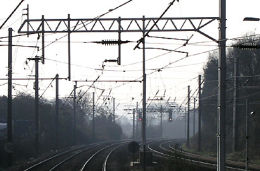Posted 9th March 2011 | 4 Comments
ATOC steps up pressure for Network Rail infracos

THE Association of Train Operating Companies has called for Network Rail to be broken up into ten regional Infracos, leaving only a small central organisation.
Network Rail has already announced that it intends to devolve power to its route directors, but ATOC wants to take the process much further.
The Association is also suggesting that some franchises could be converted into long-term concessions.
ATOC, whose members include all the franchised operators in Britain, said that Network Rail’s recent announcement on devolution was ‘welcome but does not yet go far enough to help achieve the £1 billion annual savings identified by the interim McNulty report into value for money’.
Three key elements of reform being suggested by 2014 are the creation of about ten independent infrastructure companies, or ‘infracos’, separately licensed and regulated by the Office of Rail Regulation. They would be significant FTSE-250 sized businesses and, according to ATOC, attractive to potential investors.
There would still be a ‘lean central body for essential network-wide functions, governed by the industry as a whole, rather than just Network Rail, and acting more as a service provider to its infraco and train operator clients’.
ATOC also wants ‘new franchising and regulatory arrangements that incentivise train companies to work with the new regional infrastructure businesses to form alliances or enter into commercial agreements’.
Its chief executive Michael Roberts said: “We believe this approach would lead to better and quicker decisions on projects which matter most to passengers, greater accountability to regional funders and stakeholders, and a stronger drive to improve cost-efficiency through genuine contestability between infracos in providing infrastructure.”
ATOC has also affirmed its call for vertical re-integration in some areas. It cites Greater Anglia, South West Trains, Kent, MerseyRail and Scotland as possible candidates for unified control of track and train, so that operators would also be responsible for train regulation and infrastructure maintenance, as in the days of British Rail.
A further change it suggests is the replacement of some franchises with long term concessions, saying: ‘This approach might be best applied to premium-paying intercity train operations’.
However, the proposals have been given a luke-warm reception by Network Rail.
A spokesman there said: “Just a fortnight ago Network Rail announced it is changing its structure and business to better align itself to the needs of both its customers and passengers by creating a number of new, powerful, devolved business units run by route managing directors.
“Network Rail has been playing a vital role in the government’s McNulty review into value for money for the railway and is committed to change. By better aligning risk and reward with passenger, freight and open access operators and by improving transparency across the whole industry, we can all help each other succeed and deliver not only a bigger and better railway, but a better value railway too.”
Reader Comments:
Views expressed in submitted comments are that of the author, and not necessarily shared by Railnews.

Conrad Gross, Clydebank, UK
The whole franchise system is a disaster - TOC's tell us they are going to accomplish great things but fail to deliver - just like an election manifesto. The railway indusrty is governed by so-called managers (self interested - those that are any good are bullied out) who only lick the heels of those above or their political masters. Procedeures are regularly broken, ignored or quietly modified so that things look better than they are. We need people in the right positions who take the advice of the front line staff who care - and there are not many of us left. Local management by rail enthusiasts would I think give the best results and yes, it will be cheaper!
James, London, UK
What about comment from some of the train operators themselves or the freight sector, which will be hit hardest by this kind of reform?
Paul, London, England
Private TOC's have two central motives. It's not their passengers or improvements for them, its not their employees and it's not safety.They are focused on profit and shareholder value above everything else.
Many of the TOCs operate a closed market, with limited competition with each other, where many of their customers have no choice but to use their services. If TOCs operated in competitive market and were really interestedin their customers, they would invest in the station developments and lease / purchase more rolling stock to seat their clientele and grow their markets. But they won't because, actually, they are as inefficient and lazy as Network Rail is supposed to be. Witness over-manning of platform despatch staff, whilst countless high peak trains are short formed.
This ATOC drive is not about improving services for customers, its about increasing their sphere of control to increase their profits. Nothing else. Lets hope McNulty, Hammond and the others leaning on the levers of power can see this.
Martin, Aylesbury, England
Once again we see the vested interests of some train operators trying to steer the wider industry. A lack of understanding of what is involved in operating a "Network" is apparent from the very naive suggestions of what is becoming a single interest focus group.
An approach as blinkered as this will actually cause national operators (freight cross country) as well as open access operators apoplexy. They will be marginalised. Having many adjoining networks will result in massive co-ordination issues.
There will be less savings as each InfraCo will need to resource all their yellow plant themselvesand this will require higher investment and will deliver lower overall efficiency which will drive unit costs up.
I even have reservations of the rush to devolution as it brings back the horrible memories of early Railtrack rather than the better days of Network Rail.
I am sure the Mc Nulty report will be much more encompassing and from a broader perspective than this attempt at maximising the profit potential of a few greedy Owning Groups.